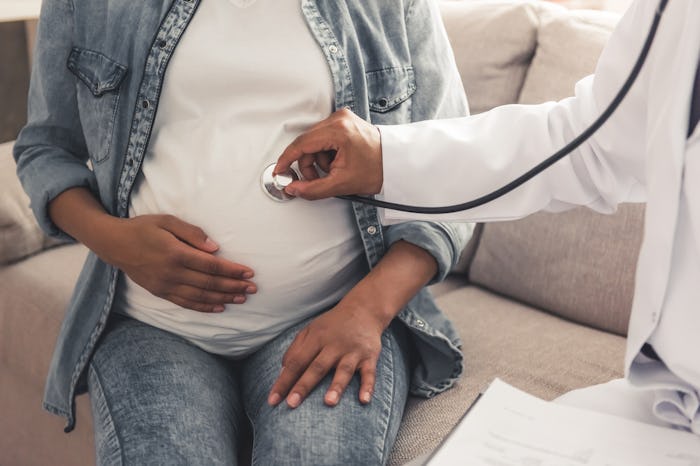News
Stress From Extreme Weather During Pregnancy Can Have "Long-Term Consequences"
Climate change is here. Just look around — floods of biblical proportions, monstrous landslides, scorching forest fires, and record-breaking heatwaves. Plus it's snowing in Hawaii and Las Vegas. And while these natural disasters are taking a major toll, the extreme weather is affecting much more than the environment. It's messing with people's mental health. And, apparently, stress from extreme weather during pregnancy can have long-term consequences, according to new research.
The study, which was published in Infant Mental Health, found that babies born to mothers who experienced natural disaster-related stress were negatively impacted, according to Science Daily. Mothers that were already predisposed to depression were even more likely to have infants that were negatively impacted by prenatal stress.
A total of 310 pairs of mothers and children from various boroughs of New York City participated in the study. As a baseline, mothers with depression during pregnancy gave birth to babies who "displayed greater distress and fear, less smiling and laughter, and lower soothability and cuddliness compared to infants of mothers with lower scores for depression," according to Science Daily. But those infants of mothers who were depressed and survived Superstorm Sandy were worse off, with greater issues surrounding temperament.
"Prenatal depression increases the risk for infants to have a difficult temperament, but when we factored in the stress of experiencing an environmental catastrophe, one plus one was not two. It was ten," Yoko Nomura, a psychology professor with the City University of New York graduate center and Queens College, said, per Science Daily. "Our research found that, compared to other babies, infants born to women who were prenatally depressed and pregnant during Superstorm Sandy had higher rates of distress."
Now, one might think that something as simple as weather, could make a difference in a pregnant mother's mental well being, but it can. The effects don't end with the culmination of a hurricane or a forest fire. They continue.
"It’s important to realize that the effects of extreme climate changes and natural disasters might not be transient,” Patrizia Casaccia, director of the neuroscience initiative at the Graduate Center of The City University of New York, said, per Nexus Media News and Popular Science. "They could have long-term consequences on the developing brain by changing the way genes are regulated and resulting in increased susceptibility to psychiatric disorders."
Like depression, stress is not always outwardly apparent.
"Stress is a silent disease," Dr. Calvin Hobel, director of maternal-fetal medicine at Cedars Sinai Hospital in Los Angeles, CA told WebMD. "Pregnant women need to be educated in recognizing when they have stress, the consequences and some of the simple things they can do to make a difference."
Signs of stress in pregnant women include insomnia, appetite changes, mood swings and others, Dinesh Bhugra, a professor and member of the World Psychiatric Association, told Mother and Baby. Bhugra added:
Prolonged stress may well affect the baby’s brain, so care must be taken to manage stress in the best way possible. Chronic heavy stress with poor coping skills could add to creating differences in brain development. Under stress, it’s well recognized that the body goes into flight or flight mode leading to a surge in your levels of cortisol, chronic stress may keep these levels high, which could cross the placenta and affect the baby. Continuing high levels of stress are problematic and every effort should be made to reduce these.
Reducing stress is often easier said than done, but there are few tried and true methods that can help, according to Parents.
- Take part in activities you truly love, like listening to your favorite music or cooking your favorite meal.
- Try gentle stretches and exercise to increase endorphins.
- Practice meditation and focus on your breath by breathing in and out slowly and mindfully.
- Create a mantra to help you get through tough times.
If it's more than stress, and pregnant women are experiencing post traumatic stress disorder related to a natural disaster, professional help should be sought, according to Kids Health.
Climate change-induced extreme weather is becoming more and more apparent. And while many in government are working towards change, regular people are left to deal with the consequences. In this case, pregnant women and their unborn children may bare the brunt of it all. The best course of action is always knowledge, and of course, seeking help when needed.
